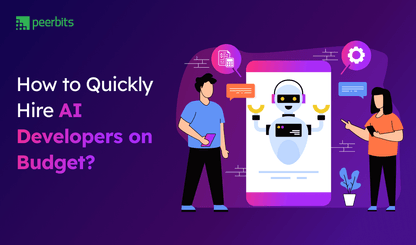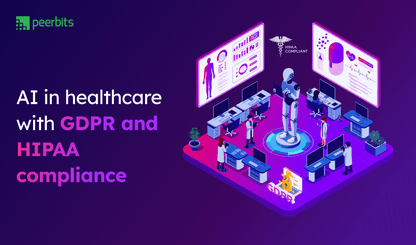Unlocking your smartphone just by showing your face to entering any organisation by scanning your face ID, you can easily spot Computer Vision at work these days.
But working on Computer Vision projects and finding the right team of AI specialists for their successful execution is highly challenging.
Computer vision is a complex and fast-evolving field, and it's not easy to find experts who are constantly keeping up with its rapid advancements.
And when new AI innovations enter the picture, it becomes even harder to find the right mix of talent in one place. Assembling experts from different sources is not only time-consuming and costly, but often fails to deliver the expected results.
So, how do you find the right computer vision development partner?
How do you choose the right company that can offer you a skilled team of Computer vision developers, choose the right tech stack for Computer Vision solutions, and successfully construct the ‘vision’ you have in mind?
Pick this article with experts sharing the best tips on how to choose the computer vision partner that has the right experience, a large pool of skilled team, and proven portfolios to back them up.
Computer Vision: Market trends & hype
With Artificial Intelligence booming in recent years, the AI-powered computer vision market has reflected a ferocious CAGR of 22.1%, with expected expansion from $23.42 billion in 2025 to $63.48 billion by 2030.
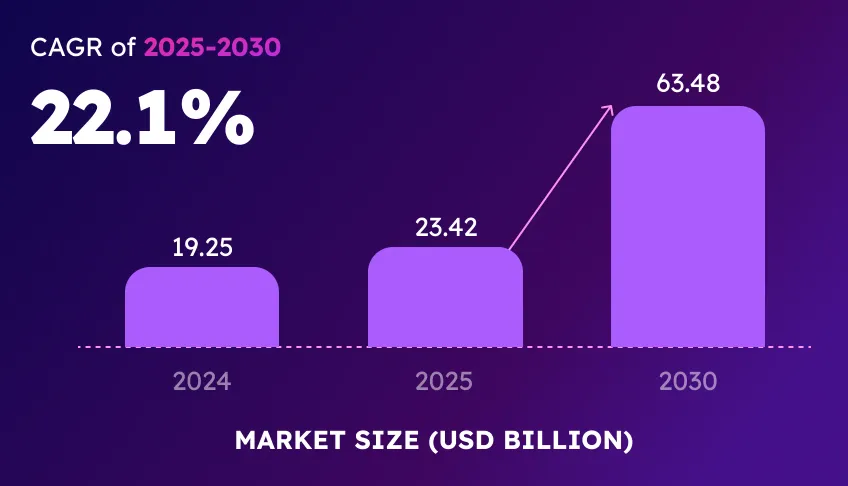
Based on Statista, in global comparison, the largest market size for Computer Vision will be the United States($8.99 billion in 2025).
Surely, Computer Vision is being actively applied by the world’s top IT firms in areas including:
Meta’s AI-powered smart glasses: They use computer vision for facial recognition, AI object recognition and real-time contextual awareness to assist users in daily tasks.
Apple Vision Pro accessibility features: Enhances camera zoom and integrates VoiceOver with computer vision for real-time AI visual imaging for visually impaired users.
Nvidia DLSS 4.0: Employs vision transformer models for image upscaling, improving image quality and performance in real-time graphics rendering.
Deepnight AI-Driven night vision goggles: Combines low-light cameras with AI-based image processing to deliver enhanced night vision at a significantly reduced cost.
Samsung Vision AI-powered TVs: Uses computer vision to adapt to user behavior and environment, turning TVs into interactive, intelligent devices.
Apparently, Computer Vision is transforming everything, whether it's from real-time facial recognition to revolutionizing interactive entertainment experiences.
But to begin with any of such projects, you need a reliable Computer Vision consulting partner. Let’s find it then!
Where to find a good Computer Vision consulting company?
You wouldn’t hire a generalist to perform surgery, and you shouldn’t trust just any “AI company” with your computer vision project either. Here’s where to start looking for capable, proven partners:
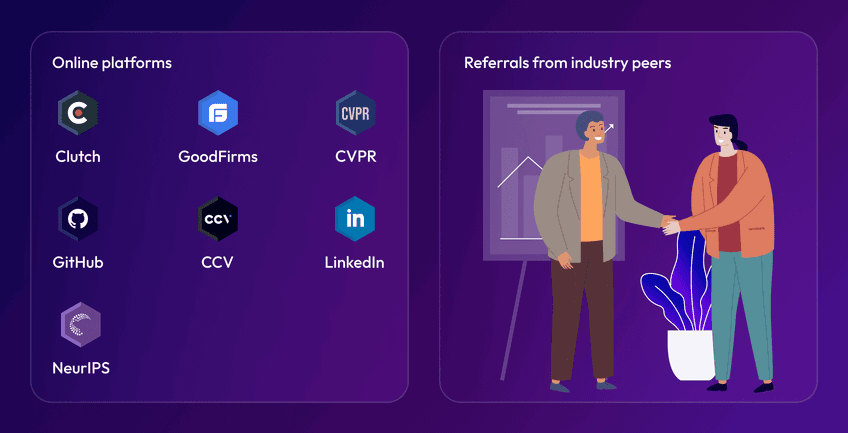
1. Online Platforms
Start with vetted directories like Clutch and GoodFirms, which list companies with verified reviews, portfolios, and areas of expertise. Look for CV-specific keywords, and pay close attention to case studies that include metrics and business outcomes. GitHub is another goldmine—search for open-source contributions in CV libraries like OpenCV, Detectron2, YOLO, or segmentation models. Real contributions are a sign of deep technical expertise.
- Explore conference sites like CVPR, ECCV, or NeurIPS. Many top-tier firms present research here and can be approached post-conference.
Don’t underestimate the power of LinkedIn. Look for engineers, founders, and CTOs actively posting about their vision projects. Their posts reveal not just capabilities, but mindset.
2. Referrals from Industry Peers
Nothing beats a firsthand review. Ask peers in the AI development services industry if they’ve worked with computer vision experts or outsourced CV work successfully. This helps you narrow down firms that already understand the challenges of your domain and can replicate success.
Warning signs to avoid
Here’s a red flag: Companies that claim “we do AI” but have no tangible, recent CV case studies.
The market is flooded with generalist AI providers jumping on the trend, but they often lack the niche skills required to deliver custom object tracking, edge deployment, or multi-angle calibration.
This risk is heightened by the significant worldwide shortage of AI talent. The Bureau of Labor Statistics projects a 21% growth in computer vision developer jobs from 2021 to 2031.
Meanwhile, 81% of UK businesses identify a lack of skilled professionals as the main obstacle to implementing AI solutions.
Outsourcing can be smart if you choose a partner who checks the right boxes. Now, what are those ‘right boxes’? Follow along!
How to choose the right Computer Vision partner?
Here are the 7 key criteria to evaluate a Computer Vision consulting partner before signing any contract or commiting for the project:
1. Technical expertise
Look for hands-on experience in:
- Deep learning (CNNs, transformers for vision, GANs)
- Deployment on edge devices (Jetson Nano, Raspberry Pi, custom GPUs)
- Multi-camera systems with real-time synchronization and calibration
- Advanced techniques like pose estimation, semantic segmentation, or anomaly detection
Ask: Do they use TensorRT for optimization? Can they handle multi-frame sequence models?
2. Domain knowledge
Every industry has its quirks. A CV model trained for warehouse safety doesn’t translate to retail footfall analytics or medical imaging.
Choose a partner who knows your domain—or has solved similar problems. They’ll bring ready-to-apply ideas, avoid common mistakes, and cut experimentation time significantly.
3. Portfolio & case Studies
Ask for measurable outcomes—not just the tech stack.
You want to hear: “We reduced manufacturing defects by 38%” or “The client now processes 10K images/hour with 96% accuracy.”
Watch for repeat business or long-term relationships in the Computer Vision case studies—that speaks to trust.
4. R&D capability
Do they innovate or just implement?
If your project involves anything beyond off-the-shelf detection models, you need a partner who invests in AI research, experimentation, and custom architecture design.
Bonus points if they have a presence at major Computer vision research conferences or contribute to open-source.
5. Scalability & support
Proof-of-concepts are easy. Scaling them is hard.
Your Computer Vision consultant should handle:
- Model optimization for production (quantization, pruning)
- Deployment pipelines (Docker, ONNX, k8s)
- Continuous learning and data drift detection
- Ensure they can move you from pilot to production, without rebuilds.
6. Team composition
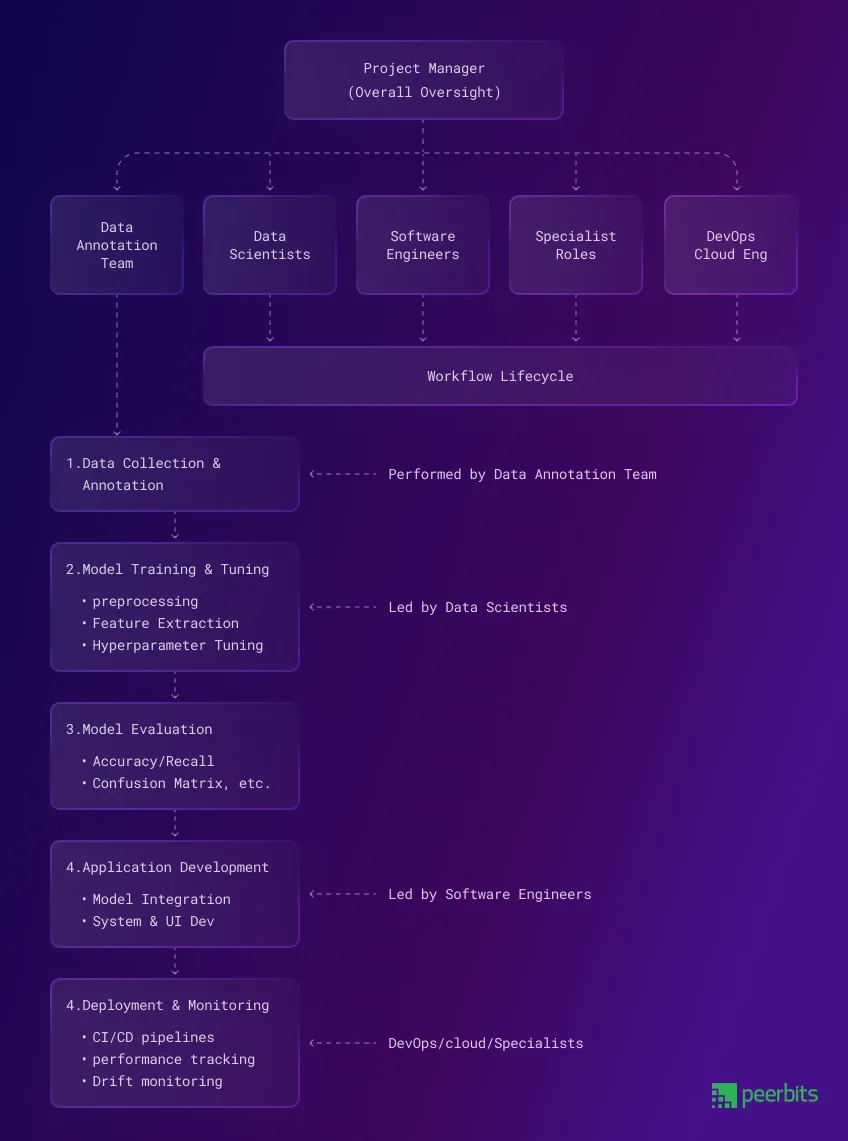
Computer vision success isn't just about having a good ML engineer.
The ideal team includes:
- Computer Vision Engineers
- Data Scientists
- MLOps/DevOps Engineers
- Annotation Specialists
- Domain Consultants
Each role plays a part—from data labeling to model evaluation to deployment—and skipping any one slows you down.
7. Transparency & communication
You don’t want to find out in week 6 that the model doesn’t work on real data.
Look for:
- Agile delivery cycles (2-week sprints)
- Clear milestone-based billing
- Weekly demo calls
- Transparent risk logs and mitigation plans
You’re hiring a Computer Vision consulting partner, not a black box.
Key areas where a CV partner adds value
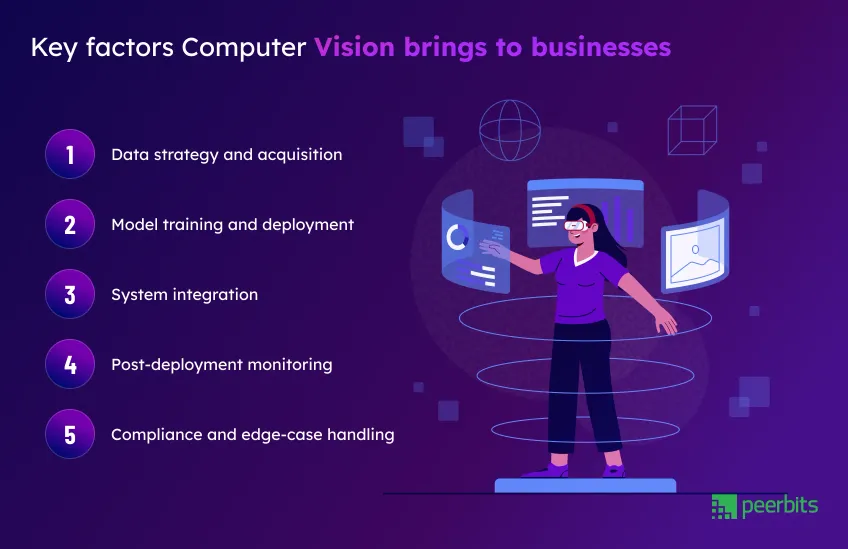
A good computer vision consulting firm does more than write code. They help you navigate the entire lifecycle:
Data strategy and acquisition
Where and how will you get your training data? What resolution is needed? Will it need labeling?
A Computer Vision consulting partner should help you plan this upfront and bring tools like Label Studio or CVAT for efficient annotation.
Model training and deployment
From selecting base models (ResNet vs EfficientNet) to hyperparameter tuning and evaluation protocols—every decision impacts performance.
A strong partner trains, validates, and retrains models in your environment, using techniques like augmentation, cross-validation, and early stopping.
System integration
Your CV model must work with your real-world tools—like your ERP, IoT gateways, camera hardware, or edge servers. Good firms integrate seamlessly with tools like Azure IoT Hub, AWS Greengrass, or PLC controllers.
Post-deployment monitoring
Models drift. Hardware changes. Lighting shifts. A responsible partner helps set up monitoring and retraining pipelines to keep accuracy high.
Compliance and edge-case handling
CV models often touch privacy-sensitive data (e.g., facial recognition, surveillance). Is the Computer Vision partner GDPR-compliant? Can they handle edge cases like occlusion or camera shake?
These details matter when real-world conditions get messy.
Checklist: What to ask before you sign the contract?
Here are 7 smart questions to ask your potential partner:
-
Can you show a past success story in our industry?
-
How do you source and annotate data for training?
-
What’s your process for moving from PoC to production?
-
Who will be on our team, and what are their roles?
-
How do you handle edge deployments and hardware limitations?
-
How do you monitor model performance post-deployment?
-
Can you guarantee data privacy and regulatory compliance?
If the answers are vague or non-technical, keep looking.
Conclusion
Finding the right computer vision consulting partner is a strategic decision. The wrong partner could waste months and budget, while the right one will accelerate your AI adoption and give you a real competitive edge.
The stakes are high, but the upside is enormous.
Prioritize long-term partnerships over quick, cheap MVPs. The best results come from teams that grow with your product, understand your industry, and stay committed from ideation through scale.

FAQs
Ask for detailed case studies with business outcomes, not just technical jargon. Confirm results like accuracy improvements, cost savings, or deployment scale.
General AI consultants may lack domain-specific CV experience. A true CV partner focuses on visual AI systems, edge deployment, and complex imaging pipelines.
Be wary of firms with vague AI claims, no domain-specific projects, or outsourced teams with unclear responsibilities and poor communication workflows.
Computer Vision consultants focus on AI-driven visual solutions using deep learning, while Machine Vision consultants specialize in hardware-based image inspection for industrial automation.


